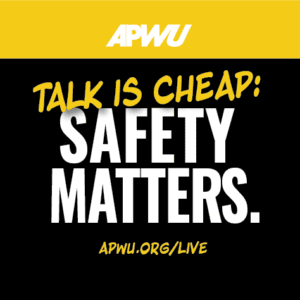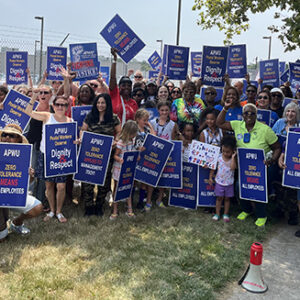August 27, 2021
Surviving a Hurricane or an Earthquake
(This article first appeared in the September-October issue of the American Postal Worker magazine)
As I write this article many APWU members are still recovering from the effects of this year’s devastating weather. My prayers go out to my APWU families who were adversely affected. Natural disasters demonstrate the importance of preparing an emergency plan which can reduce serious injury or loss of life during a hurricane or an earthquake. Listed are tips to help you prepare when disaster strikes:
Check for Hazards – Repair all electrical wiring leaky gas connections cracks and structural damage in your home. Place large heavy and breakable items on lower shelves in closed cabinets with latches. Have Disaster Supplies – Buy a battery-operated radio and flashlights extra batteries a first aid kit and a non-electric can opener. Keep a seven-day supply of food bottled water medication and cash. Have a fully charged phone and fill your car with gas in case of evacuation. Copy all vital records; keep them in a waterproof container. Store original copies in a safe deposit box. Take photos and/or videos of all valuables. Have an extra pair of eyeglasses house and car keys.
Identify Safe Places – If inside when disaster strikes drop to the floor – stay under sturdy heavy furniture or against an inside wall away from where glass could shatter or where heavy furniture could fall over. If you are outside stay in the open; keep away from buildings; trees; telephone and electrical lines; overpasses; elevated expressways; and/or roads bridges and ramps that might have been damaged. If you are in an automobile stop as quickly as safety permits and stay in the vehicle away from trees or buildings.
Educate The Family – Teach children how to call 911 the police or fire department. Learn how to use the shutoff valves for water gas and electricity.
Develop an Emergency Communication Plan – In case of family separation ask someone out-of-state to serve as the “family contact.” Ensure everyone knows their name address and phone number. Designate someone to pick up kids from their school or daycare center in case you are unable to do so. Attach identification tags with your name and address to pets.
Follow Safety Precautions – Listen to the radio or television for emergency information. Use the phone only in emergencies. Stay indoors away from windows and glass doors. Close storm shutters curtains blinds and all interior doors. Secure outdoor objects and brace external doors. Turn off propane tanks. Turn the refrigerator thermostat to its coldest setting and avoid opening until necessary. Fill the bathtub and large containers with water for flushing toilets and cleaning. Never run a generator inside a basement or garage unless the equipment is professionally installed and vented.
When to Evacuate? – Evacuate if your family’s safety is at risk and/or when directed to do so by local authorities. Returning Home – Return home only when authorities say it is safe. Do not use elevators. Open cabinets cautiously and clean up spills immediately. If you live in coastal areas stay away from beaches. Contact the gas company an electrician or a plumber as appropriate if you have a gas leak electrical or water damage. Avoid drinking tap water until its safe.
For additional information contact your local Office of Emergency Services your local American Red Cross chapter or visit the Federal Emergency Management Agency (FEMA) Website at fema.gov.
Resources for this article include text from the American Red Cross and FEMA.
Sign up for News



